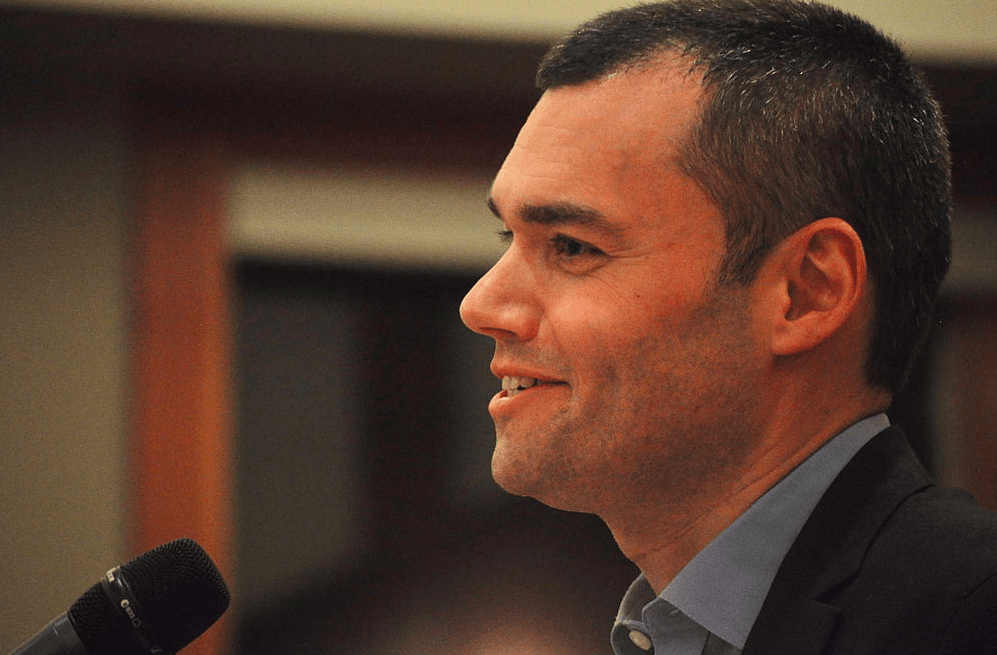Israel Detaining Jewish Activists for Supporting Palestinian Rights
An incident involving writer Peter Beinart, who was stopped at the airport in Jerusalem, is the third in three weeks. Peter Beinart. (Joe Mabel / Wikimedia Commons)
Peter Beinart. (Joe Mabel / Wikimedia Commons)
Facing backlash against its controversial “nation-state bill,” passed last month, Israel has detained Jewish writers and activists who oppose the law’s definition of Israel as an entirely Jewish state, with no mention of the value of democracy or equal rights for Palestinians.
On Sunday, writer, professor and political commentator Peter Beinart was on vacation, traveling from Greece to attend a family bat mitzvah in Israel when he was detained by the Shin Bet, Israel’s security agency, at Ben Gurion Airport in Jerusalem, he reported Monday in an article for The Forward.
Beinart’s was one of three such detentions at airports and border crossings in recent weeks.
Israel-born poet Moriel Rothman-Zecher arrived at Ben Gurion with his wife and infant daughter on July 29. Agents allowed his family through customs but detained him for approximately three hours, claiming his involvement in nonviolent protests was a “slippery slope” to violence against the state, and asking him for the names of pro-Palestinian and peace organizations and of fellow activists and friends.
Rothman-Zechner called the experience “jarring and unpleasant” but acknowledged how common and more abusive the situation is for countless Palestinians, and anyone else without his Israeli citizenship and white privilege.
He wondered how he would explain the incident to his daughter when she is older. “It’s painful to think about telling her one day, ‘Hey kid, on our first visit to Israel, your aba [father] was detained at the border because he thinks Palestinians are human beings deserving of equality,’ ” he said.
A week after Rothman-Zecher’s detention, Simone Zimmerman, a founder of IfNotNow, an organization of young American Jews fighting Israel’s occupation of the Gaza Strip and the West Bank, was detained with a friend, Abigail Kirschenbaum, at the Taba Border Crossing between Israel and Egypt.
According to New York magazine, the two “were held for roughly three and a half hours, had their phones inspected, and were asked a litany of queries about their opinions of Prime Minister Benjamin Netanyahu, their involvement with human-rights groups, and their interactions with Palestinians, among other topics.”
The incident involving Beinart occurred a week after the detention of Zimmerman and Kirschenbaum. While long an advocate for a two-state solution and Palestinian rights, in the past Beinart has been more cautious about separating his advocacy for the Palestinian people from his Zionism and defense of a Jewish state. Those nuances, however, may be lost on Israeli security forces.
“I was detained and interrogated about my political activities,” Beinart writes, describing how agents first detained him with his family, asking innocuous questions about where they were from and why they were in Israel before escorting Beinart separately to another room, where the questions turned accusatory and aggressive:
Was I involved in any organization that could provoke violence in Israel? I said no. Was I involved in any organization that threatens Israel democracy? I said no—that I support Israeli organizations that employ non-violence to defend Israeli democracy.
The agent then confronted Beinart about his participation in a protest on his last trip to Israel, one that Beinart explained was due to “the fact that Palestinians in Hebron and across the West Bank lack basic rights.” He described his involvement in The Center for Jewish Nonviolence.
The conversation took a strange turn after that, with the interrogator comparing the center with North Korea. As Beinart recalls:
He asked if the Center had incited violence, and I replied that, as its name suggests, it practices non-violence. My interrogator then replied that names could be misleading. The government of North Korea, he observed, calls itself a democracy but is not. I told him I didn’t think the Center for Jewish Nonviolence and the North Korean government have much in common.
Beinart recognizes that he had immense privilege due to being white and Jewish and armed with the phone number of a lawyer, whom he called and who helped set him free. He also was the only one of the three recent detainees to receive an apology from Shin Bet and a rare admission of wrongdoing from Prime Minister Netanyahu.
“We are sorry for the distress caused to Mr. Beinart,” a Shin Bet spokesperson said in a statement, The Times of Israel reports. Netanyahu called the incident “an administrative mistake” and “immediately spoke with Israel’s security forces to inquire how this happened.”
For Beinart, Netanyahu’s statement didn’t go far enough. On Monday he tweeted, “Benjamin Netanyahu has half-apologized for my detention yesterday at Ben Gurion airport. I’ll accept when he apologizes to all the Palestinians and Palestinian-Americans who every day endure far worse.”
Your support matters…
Independent journalism is under threat and overshadowed by heavily funded mainstream media.
You can help level the playing field. Become a member.
Your tax-deductible contribution keeps us digging beneath the headlines to give you thought-provoking, investigative reporting and analysis that unearths what's really happening- without compromise.
Give today to support our courageous, independent journalists.






You need to be a supporter to comment.
There are currently no responses to this article.
Be the first to respond.